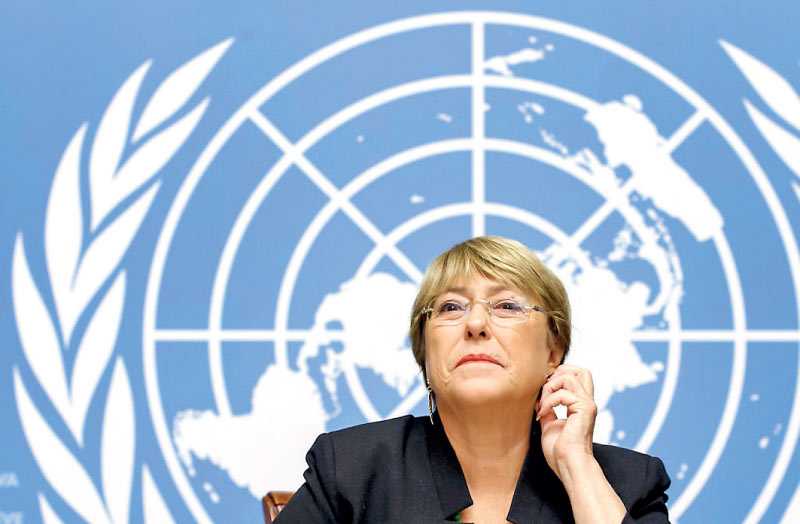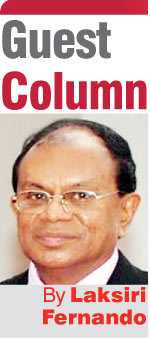Monday Feb 16, 2026
Monday Feb 16, 2026
Friday, 5 March 2021 00:00 - - {{hitsCtrl.values.hits}}

At this stage what is important is to resist the undue interferences, dictates and bullying coming from the UN High Commissioner for Human Rights, her Office, and the so-called Core Group
 Developing countries, including Sri Lanka, should be practical, pragmatic and openminded to listen to the views, nationally and internationally, in resolving their ethnic, human rights and other problems, but obviously not to the dictates, undue pressures or bullying.
Developing countries, including Sri Lanka, should be practical, pragmatic and openminded to listen to the views, nationally and internationally, in resolving their ethnic, human rights and other problems, but obviously not to the dictates, undue pressures or bullying.
At this stage what is important is to resist the undue interferences, dictates and bullying coming from the UN High Commissioner for Human Rights, her Office, and the so-called Core Group. It is hilarious that the Geneva Office that drafts reports, recommendations, and runs all sorts of activities is not the office of the Human Rights Council, but the Office of the High Commissioner!
High Commissioner is like a President of a dictatorial country. That is the democracy you have there now who preaches democracy to the developing nations. Developing and poor countries cannot get proper access to this Office, and only the rich countries and their supported NGOs can do so. This is democracy to them, not to us.
From Centre to Office
There has been a dramatic change in the way that human rights have been handled by the UN and its agencies, primarily by the UNHRC since 2006. This was not the case during the UN Commission on Human Rights. The office of the Commission on Human Rights or more correctly the Centre for Human Rights in Geneva was not only an office for the Commission, but also for all countries, rich or poor. This change must have happened as a late response to the neo-liberal economic and political order to control the world and particularly the poor countries. Even the influential international NOGs have come under this hegemony, although even before they had some of these hegemonic attitudes.
I make my criticisms through experience in Geneva (1984-1991) and thereafter through research including a PhD on human rights at the University of Sydney (1992-1995). Since then, I have been teaching, researching, and writing on human rights. Let me first relate what I was doing in Geneva. “Laksiri Fernando has been in the employment of World University Service (WUS) since September 1984 based in the organisations International Secretariat in Geneva. Since that date he has held the post of Associate Secretary for Asia/Pacific, an executive post.” This was written by the WUS’s General Secretary. He further said, “Mr. Fernando was responsible for the development of WUS’s new program of Human Rights from its inception.” (1985).
“His work in respect of human rights has involved contributing to the conceptualisation of the work of WUS in the field of human rights; developing cooperation with a range of UN and non-governmental organisations working on human rights issues; producing and editing written materials in regard to the program…” More importantly, the following was what the Chief of the Centre for Human Rights, United Nations Office at Geneva stated in 1991.
“Laksiri Fernando is known to us for several years. We have had occasion to work together in his capacity as representative for World University Service (WUS), and its efforts in the field of human rights. This experience extended to the United Nations human rights bodies, and in particular the Commission on Human Rights, as well as the Centre for Human Rights.”
“In the context of the Commission, the contribution of Laksiri Fernando in the field of human rights education was fundamental. In particular, since 1988, with the launching of the World Human Rights Information Campaign by the General Assembly of the United Nations, the emphasis on human rights education made it possible to work closely with Mr. Fernando. Other scholars in the field have also benefitted from WUS and the contribution of Mr. Fernando’s experience. Thanks to his effective planning and knowledge of the subject, it was possible to see progress in the field of human rights education already in the early stages of the Campaign.”
During the period of 1980s and 1990s the approaches of the UN Commission on Human Rights were constructive, painstaking, dialogical, and understanding of the intrinsic socio-economic problems of the developing and poor countries. Instead, now the approaches have become superficially legalistic, arrogant, partial, and dictatorial. One example is the long list of authoritarian recommendations in the Report of the High Commissioner for Human Rights on Sri Lanka.
Continuous bullying
How many Reports and Resolutions that the so-called High Commissioners have persuaded the Human Rights Council to approve, with the help of the British led Core Group, against Sri Lanka? Over 1½-dozen during the last 12 years. They now hardly mention the resolution S-11/1 adopted in May 2009 with an overwhelming majority. It was against that resolution they appointed their own Panel of Experts without even requesting the GoSL to nominate any member.
It was after that Sri Lanka appointed the LLRC commission. The report was comprehensive, and still is a good building block for accountability and reconciliation. But the then High Commissioner was not satisfied and then passed the 19/2 resolution in 2012. Even the present Report says the recommendations of the LLRC were dissatisfactory. The Government also appointed the Paranagama Commission on the question of missing persons and that was also rejected by the High Commissioner. During this period there was much progress in the resettlement of displaced persons, rehabilitation of former LTTE cadres and child soldiers, and reconstruction and development of infrastructure and livelihoods of the people.
It may be true that the accountability matters did not make much progress to the satisfaction of the aggrieved parties or the High Commissioners/Office. One reason among others was that the accusers/victims were asking for arbitrary justice. Weaknesses in the legal/judicial system and political hesitations also could have been factors. When there is so much of arbitrary international pressure, it is obvious that political hesitations also could occur.
Of course, the Geneva Office managed to get the co-sponsorship for the resolutions 30/1, 34/1 and 40/1 from the last Government. Perhaps the Government or the Minister was so desperate and succumbed. But has there been a satisfactory progress during that five years (2015-2020) to the satisfaction of the so-called international community? The greed for controlling culturally different poor countries is quite insatiable, it appears, particularly under the neo-liberal system. There are of course accomplices from some poor countries themselves and, also from Sri Lanka. The hypocrisy is not with the Western people, but primarily with the Western politicians.
Moral imperative
Jehan Perera’s last article (23 February) titled ‘An Adequate Response Needs to be Given to the Case for International Justice’ clearly admits that international bullying comes because of the strategic importance of Sri Lanka. “In itself Sri Lanka is an interesting and important country for world politics at present,” he says.
However, his conclusion is quite submissive further saying, “This resolution will be presented by a core group of countries led by the United Kingdom and will be supported by the United States which, though not a current member of the UNHRC, has opted to return to it under the presidency of Joe Biden. This will be a powerful combination for a small country like Sri Lanka to challenge.”
My opinion is different. If the motives behind are immoral and dubious, it should be opposed very strongly of course rallying the ‘third world’ support as much as possible. The big powers do not have any moral right to bring any resolution against any country under the conditions of worldwide coronavirus pandemic at present.
Even in the approved procedures on ‘how to bring a resolution, discuss/negotiate, and voted on,’ there are no provisions of doing so in a virtual meeting of the Human Rights Council. If there are no possibilities for an accused or a victim country to properly discuss and negotiate a resolution in Geneva, that is completely undemocratic.